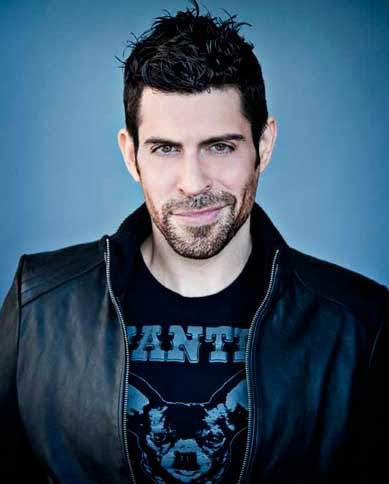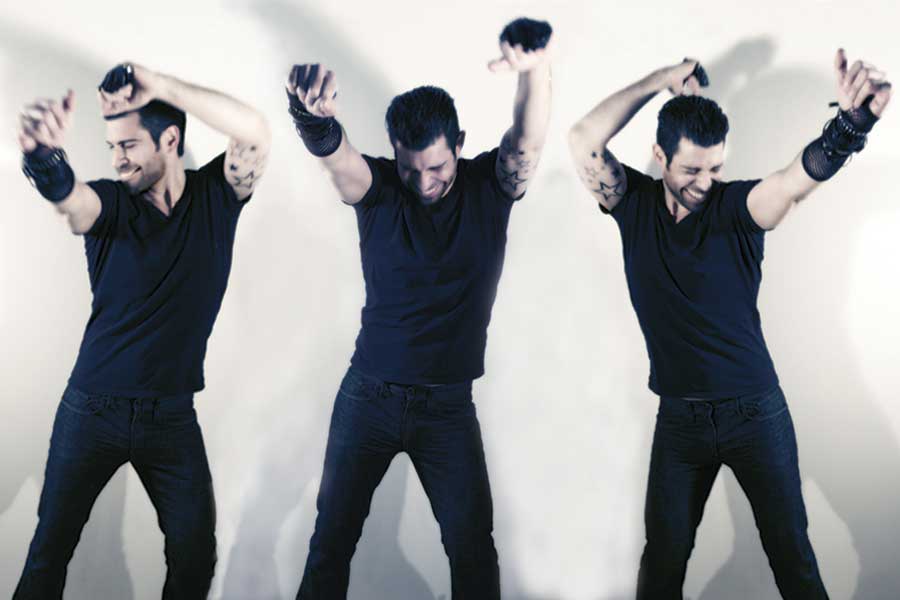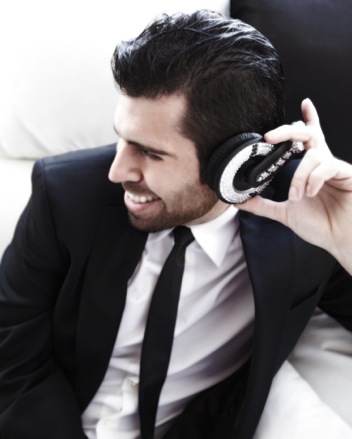
These days, there is a preponderance of high-production-value music entertainment shows (which will remain unnamed), determined to throw big money at a captivated audience, which has led to the increasing desensitizing of the very audience they attempt to captivate. The end result is, more often than not, the repurposing of some tried and true (and dare I say tired) formulaic episode desperate to pull at our already frayed collective heartstrings. And asterisk this: Arguably, ratings show an exodus en masse.
However, even for the sometimes-jaded critics, once every so often, seemingly out of the depths of obscurity, there emerges a talent with true grit and determination, ready to embrace you, transport you to a place unfamiliar to the mundane and lift your spirit. Maybe even disarm you, so as to allow you to escape into a lighthearted world of fun and dance.
 Enter Eric Alán.
Enter Eric Alán.
Yes, there are plenty of talented (and not-so-talented) singer/songwriter pop/dance artists out there clawing their way through the maze of the deregulated and pirated world of music downloads, looking for their market share. But with Eric you find something completely different, something quite unique.
You see, Eric Alán's trajectory has been anything but uneventful. Yes, he's gay and had it rough growing up. Not to diminish his story (he was a gay boy growing up in a strict Jehovah's Witness household that condemned his "sinful ways," and he was sometimes beaten by his alcoholic father, with his mom standing idly by), but he did come out the other end without being tied to a fence post and left to die, so to speak. He is one of the lucky ones. Eric grew up quickly, and with that, instead of turning to drugs and God knows what else, he quickly developed an instinct for survival. For Eric, survival meant expressing himself through music. Inspired and encouraged by his late Aunt "Tía" Lilia, who insisted that he follow his dreams, he fought hard to become self-sufficient, and in so doing, he was able to embark on a dream as he honed his craft.
Aside from his obvious musical talent, one of the things that fascinate me about Eric is what he does to make a living. He makes ends meet by working as an offshore oil-rig worker, living in the middle of the ocean for 21-day stints. Regardless of whether he is a driller, a derrickman, a shakerhand, a mudman, a toolpusher, a floorman or roughneck, my hat is of to him. His is a gritty job, and a tough one at that.
Martin Berusch: Eric, so far, we know that you got into the music scene pretty early on. Could you tell us a bit more about that?
Eric Alán: I grew up in Southern California. When I first came out, I started to go to gay clubs, and pretty much like everyone else, I just wanted to let loose. I literally was spotted singing and dancing on the speakers of a club. Shortly after that, I found myself performing at many festivals and nightclubs.

Berusch: How would you describe your musical style, and who influences you?
Alán: I'd have to say that my musical style is simple and straightforward with respect to its production value. It's infused with electronic dance vibes, driving and infectious rhythms, which definitely has a Latin flare. I consider it very expressive, a bit haunting and definitely danceable, cocky and fun. Many artists have inspired me over the years, but on the top of my list, I would credit Dave Gahan of Depeche Mode and Madonna as my biggest influences.
Berusch: Do you recall your first song? What was it about?
Alán: My first song was recorded in Spanish and was called "Carcel de oro" ("The Golden Jail"). It was about a failed relationship with another Latin guy. I find Spanish to be such a romantic language, with such a robust and nuanced vocabulary that it just seemed right to sing it in Spanish. Also, to be honest, I was pretty sure this guy would hear the song at some point, and knowing that was to a small degree the motivating factor in having sung it in Spanish. It turned out to be somewhat vindicating and cathartic at the same time.
Berusch: You've recorded songs both in Spanish and in English. Are you drawn to one language over the other?
Alán: Having grown up in a predominately Hispanic household, music was always a large part of the family experience. In one way or another, everything I create is an extension of me and therefore influenced by something in my life. That's what manifests when I record in Spanish, but conversely, as an American, English is just as much a part of my identity as is my Hispanic heritage. I guess that the takeaway here is that my music comes from a very personal place, along with all my experiences and emotions, and both English and Spanish are inextricably linked within my psyche.
Berusch: You've told me that you grew up in a strict Jehovah's Witness family. How did your family react to the news when you told them you are gay?
Alán: I finally told my family, including my parents, when I was about 20 years old. They reacted as expected. I'm very certain that they knew early on about my sexual orientation, considering that as a toddler, my father caught me wearing one of my mother's dresses and high heels and proceeded to beat the crap out of me. Again, I remind you I was a toddler then. However, aside from the occasional fag jokes and homophobic undertones, the issue never surfaced. It was easier to sweep this "abominable behavior" under the proverbial rug. So it wasn't until I openly came clean and I explained that I am gay that it actually became a problem for my parents. From that point on, my parents basically exiled me from their lives and didn't want to have anything more to do with me. Eventually, the initial impact wore off, and they did back off just a bit, but it was never the same between us again. I would never be accepted as their son again, and sadly, we haven't spoken in years. I wrote a song about the whole experience that will be on my next album. It's called "Something I Cannot Erase."
Berusch: I'm sure that is a very painful memory to recall, and I appreciate your candidness in sharing that story with us. Now, speaking again of your music, what is the background behind 2011's "Pornstar" single? Did it have any effect on the direction of your music?
Alán: I see music only as a part to a bigger story. I haven't quite decided if "Pornstar" actually changed the direction of my music per se, but maybe it did help package and focus me little more, at least to the point where I wanted to go in artistically. Now that I think about it, "Pornstar" actually kind of took on a life of its own after I recorded it and put out the video. Initially, it was meant to be a fun, "dancey" yet intimate dance song, looking to soften and redirect the general taboo placed on porn. It intends to be somewhat self-deprecating, not to be taken too seriously, while maintaining a sexy visual and equally sexy acoustic quality. The humor behind the song is meant to propose the acceptance of "suggestive" material for the mainstream audience, much the same as the French do with their "racier" visuals on French TV commercials. Once I started working with a new producer and on new material, we were looking for a thread that could tie the old with the new. The song "Pornstar," by virtue of its name, coupled with sexual images and its beats, was a no-brainer. The music went in a more naughty and sexy direction yet maintained its playful nature. This is also true of the concept for the new music video as well. Although very "vanilla," I actually included porn stars and models in my upcoming video. So far I'm pleased with the results. The "L. O. V. & E." video features Latin pinup model Gio Dell along with the late Arpad Miklos, who very recently and tragically took his own life. Even if in a small way, I hope that "L. O. V. & E." will be considered "in memoriam" to Arpad's life and struggles.
Berusch: So you're dropping "L.O.V. & E." on March 26, 2013. What is that single about?
 Alán: Yes! "L. O. V. & E." is cocky, sexy and fun with a Latin flare. I see it as if Madonna, Dave Gahan and Ricky Martin were all to have a "music baby," the end product would be "L. O. V. & E." It's about unabashed freedom of sexual expression. No apologies, no strings, just fun! It's also a deliberate play on narcissism, as the "E" does represent the climax of "love" while also representing the "E" for Eric.
Alán: Yes! "L. O. V. & E." is cocky, sexy and fun with a Latin flare. I see it as if Madonna, Dave Gahan and Ricky Martin were all to have a "music baby," the end product would be "L. O. V. & E." It's about unabashed freedom of sexual expression. No apologies, no strings, just fun! It's also a deliberate play on narcissism, as the "E" does represent the climax of "love" while also representing the "E" for Eric.
Berusch: What's next for you, Eric?
Alán: Staying busy! My main focus is finishing the album, along with another video or two, as well as some live appearances, interviews and performances along the way.
Berusch: Any love interests, pun intended, wink, wink?
Alán: Staying single for now. I do work 21 straight days on the rig and 21 days off. During my off days, I am tearing up the town -- New York City, that is -- focusing on writing, recording, promoting and scheduling performances. My calendar is maxed out, so I can't honestly see how I could throw a relationship into the mix just yet. I just don't think that would be fair to the other person. But hey, you never know!
Watch the "Pornstar" video:
Listen to "Pornstar (Jeffrey P. Domination Remix)":
Go behind the scenes on the "L. O. V. & E." video:
To keep up with Eric Alán, visit ericalanonline.com. There you will be able to check out his single "Pornstar" and other tracks, as well as photos and more information on this artist on the rise.